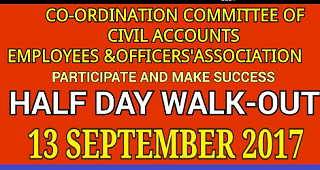Government of India
Ministry of Finance
Department of Expenditure
Controller General of Accounts
E Block, GPO Complex
INA, (sew Delhi-110023
Subject: Proposed half day walk out from the work place on 13th September, 2017 .
Co-ordination Committee of Civil Accounts Employees and Officers Associations represented by AICAEA, AICAEA category-ll (not recognized) and AIAPAO Civil (not recognized) have given notice that the members of the associations will stage a half day walk out from the work place on 13th September, 2017 for the second half.
2. Attention is invited to the provisions of Government of India (Ministry of Home Affairs) OM No. 25/23/66-Estt(A) dated 09.12.1966 (reproduced as G.l. decision No. 2 below Rule 7 of CCS (Conduct) Rules, which inter-alia provides that under Rule 7 (ii) of rules ibid, a Government servant shall NOT resort to or in any way abet any form of strike in connection with any matter pertaining to his service or the service of any other Government employees. If any Government servant resorts to any action in violation of Rule 7 (ii) of CCS (Conduct) Rules, disciplinary action would have to be taken against him.
3. Attention is also invited to proviso to FR 17(l) according to which any employee(s) who is absent from duty without permission shall not be entitled to any pay and allowances during the period of absence. Further, unauthorized absence shall be deemed to cause an interruption or break in service of the employee under FR 17(A).
4. In this regard, the following decisions of the Supreme Court may also be brought to the notice of the employees under your Ministry/Department. The Supreme Court has held in the case of T.K. Rangarajan Vs. Govt. of Tamil Nadu [2003(6)SLR] that no right exists with the Govt. employees to strike, whether fundamental, statutory or an equitable right. In All India Bank Employees Association Vs. National Industrial Tribunal & Ors., (1962 (3) SCR 269) the Constitution Bench of the Supreme Court specifically held that even very liberal interpretation of sub-clause (C) of Clause (1) of Article 19 of the Constitution cannot lead to the conclusion that the trade unions have a guaranteed right to strike, either as part of collective bargaining or otherwise. There is no statutory provision empowering the employees to go on strike. The Supreme Court also agreed that going on strike is a grave misconduct under the Conduct Rules and that misconduct by Government Employees is required to be dealt with in accordance with law. Hence, once it is proved that an employee has committed the misconduct of going on a strike in any form, the Supreme Court has held in Bank of India Vs. TS Kelawala [1990 (4) SLR 249] that he will have to face the consequences which may include deduction of wages and even dismissal from service.
5. In this context, it is clarified that strike means refusal of work or stoppage or slowing down of work by a group of employees acting in combination and includes:
iv) mass abstention from work without permission which is wrongly described mass Casual Leave.
v) refusal to work on overtime where such overtime work is necessary in public interest.
vi) resort to practice or conduct which is likely to result in or results in the cessation or substantial retardation of work in any organization. Such practice include what are called, ‘go-slow’, ‘sit-down’, “pen-down’, ‘stay-in’, ‘token’, sympathetic’ or any other similar strike as also absence from work for participation in a ‘Bandh’ or similar movements.
6. Accordingly, Casual Leave or any other kind of leave, if applied for, should not be sanctioned to the officers and employees during the period of proposed half day walk out from the work place on 13th September, 2017 for the second half and it should be ensured that the strike related activities are not allowed inside and around the office premises. It may also be ensured that the employees are not prevented from attending to the office work. Suitable contingency plan may be worked out for carrying out the various functions in field offices and Principal Accounts Offices.
7. The above instructions may be brought to the notice of staff working under your control. All the Pr. CCAs/CCAs/CAS are requested to deal with the cases in respect of employees, who resort to action as above, in the light of above referred instructions.
8. This issues with the approval of the competent authority.
(S.K. Gupta)
Sr. Accounts Officer

COMMENTS